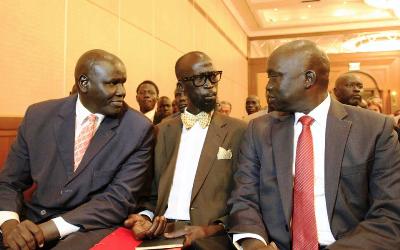South Sudan rivals fail to commit to face-to-face talks
By Tesfa-Alem Tekle
January 5, 2014 (ADDIS ABABA) – South Sudanese political rivals gathered in Ethiopian capital, Addis Ababa for peace talks on Saturday failed to agree on direct talks to end weeks of violence in the country.

This is third time for the two warring parties to delay negotiations since they arrived in Addis Ababa on Wednesday. The talks are being brokered by East African regional bloc, the Inter-Governmental Authority on Development (IGAD).
Mediators refused comments to Sudan Tribune on why the direct talks are still facing setbacks.
However, ongoing fierce fighting on ground in parts of South Sudan as well as the rebels’ unmet demands for the release of senior political prisoners are believed to be causes delaying the formal ceasefire talks.
A General from the South Sudanese army (SPLA) was reportedly killed on Sunday in fighting outside the town of Bor in Jonglei state, which remains under rebel control.
Sources close to the talks late on Sunday told Sudan Tribune that the two sides returned to indirect talks through the IGAD mediators on Sunday as both sides failed to agree on an agenda.
The mediator’s top priority is for the warring parties to agree to an immediate ceasefire and the release of the remaining political prisoners.
However as fighting rages on for control of Jonglei and oil-producing Unity and Upper Nile states, the sides seem to be trying to gain the advantage on the ground to enhance their negotiating position.
The African Union (AU) and the international community has mounted pressure against the President Kiir and his former deputy, who Kiir sacked last year, to reach on an immediate truce.
The US government has also urged the two parties to commit to direct talks to bring a rapid and tangible progress to end the ongoing conflict which has claimed lives of over 1,000 people and displaced tens of thousands, according to the UN.
“The parties must use these talks to make rapid, tangible progress on a cessation of hostilities, humanitarian access, and the status of political detainees,” State Department spokeswoman Marie Harf said in a statement on Saturday.
“There can be no military solution to this conflict,” she added.
“Forging a durable and lasting peace depends on resolving the underlying political causes of the conflict.”
Fighting in the world’s youngest nation erupted mid-December in disputed circumstances. Kiir has accused forces loyal to Machar of staging a coup attempt.
Machar and the 11 politicians arrested after the fighting began, have all categorically dismissed the allegations, claiming that a fight began spontaneously among soldiers in the presidential guard.
(ST)
